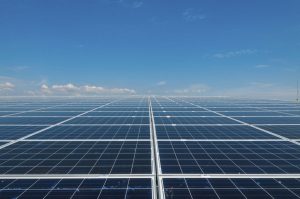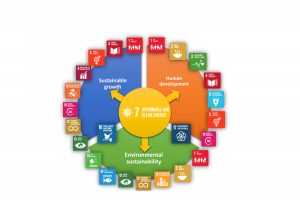Bisanti, a landlocked community of 1,600 people has seen electricity from the sun change the way they live every day, reports OGN.
In July 2015, indigenous renewable energy firm – GVE Projects Ltd teamed up with Nigeria’s Bank of Industry Nigeria (BoI), United Nations Development Program (UNDP) and the Institute of Electrical Electronics Engineers (IEEE), to build a 37.8 kilowatts peak (kWp) photovoltaic (PV) solar-based mini-grid project in Bisanti, a landlocked community in Katcha area of Niger State.
At that time, folks in Bisanti reportedly relied on petrol-powered generators, kerosene and candle lamps, as well as firewood, as their main energy sources. They perhaps had no idea the sun which repeatedly beat down on the roofs of their homes was an energy source that could change the way they lived and worked, and even make life a lot easier for them.
Though, an hour away from Minna, Bisanti, just could not raise the value of its agrarian economy beyond the subsistence level it operated, and like most Nigerian rural communities that are still not connected to the national power grid, it had to deal with the challenges of no electricity, especially for processing its agro-products for the market.
Enter GVE, BoI, others…
Intended to field-test the technical and commercial viability of adopting renewable energy for off-grid rural electrification, GVE, BoI, UNDP and IEEE mapped out and adopted Bisanti to host the pilot solar mini-grid project, and it was reportedly completed within three months.
During its construction, the project was reported to have created 60 direct and indirect jobs which in turn generated an estimated N2.75 million in financial wealth to the beneficiary members of the community who were engaged for construction, survey, labour, and other related activities.
Now completed and operating for two years, the project has first provided stable solar electricity to 200 households of approximately 1,600 people at 8 persons per house, delivered 22 street lighting points along the main street of Bisanti to enhance security in the community at night, and reduced energy-related expenditures of the people by 50%.
The electricity from the solar mini-grid has also significantly improved health care access in Bisanti and reportedly reduced reported cases of malaria in its clinic by as much as 60%. This is in addition to creating 35 new small businesses which have been able to employ 83 people in the community.
Describing the impact of the project in its two years of operation as phenomenal, GVE’s Managing Director, Ifeanyi Orajaka, disclosed via his twitter handle, that the project implementation engaged and transferred skills to 38 indigenes of Bisanti who are all currently making a living off the skills they gained.
Orajaka, equally noted that the introduction of solar electricity in Bisanti has improved learning conditions and literacy level for children in its school, adding that education workers posted there to work are now eager to stay back and teach the community’s children.
Equally on the scale of climate change contributions, the project has been appraised to offset about 365.2 metric tons of CO2 annually in the community, thus, preserving its natural environment and improving the living standards of folks.





